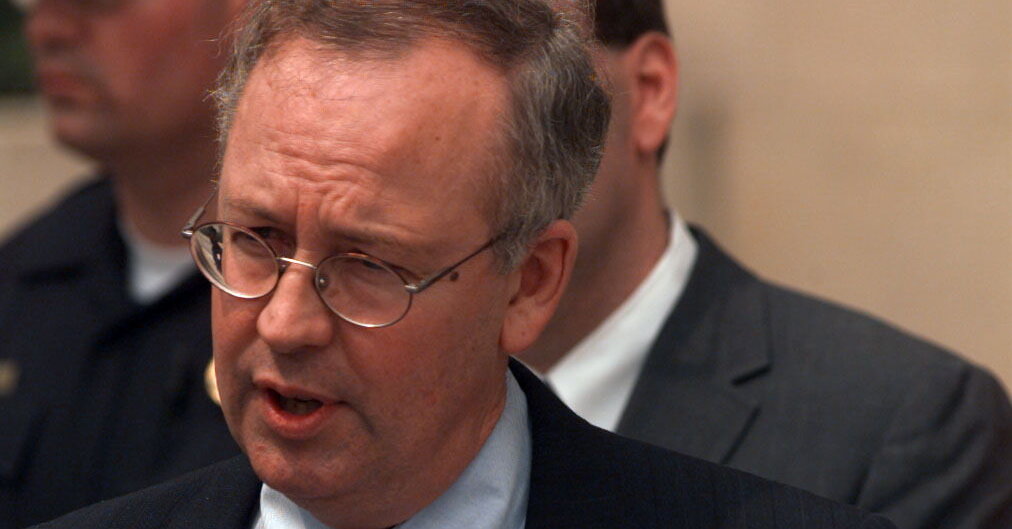

WASHINGTON — Ken Starr, the independent counsel whose investigation uncovered a White House sex scandal that riveted the nation and led to President Bill Clinton’s impeachment for lying under oath and obstructing justice, died on Tuesday at a hospital in Houston. He was 76.
His wife, Alice Starr, said he had spent the last 17 weeks at Baylor St. Luke’s Medical Center fighting an undisclosed illness and died of complications of surgery, but gave no further details.
For a time, Mr. Starr was a household name, and his investigation into Mr. Clinton’s affair with a former White House intern, Monica S. Lewinsky, propelled issues of sex, morality, accountability and ideology to the center of American life for more than a year.
He became a Rorschach test for the post-Cold War generation, a hero to his admirers for taking on in their view an indecent president who had despoiled the Oval Office, and a villain to his detractors, who saw him as a sex-obsessed Inspector Javert driven by partisanship. His investigation tested the boundaries of the Constitution when it prompted the first impeachment of a president in 130 years and scarred both Mr. Clinton’s legacy and his own.
He returned to the public stage in 2020 as a lawyer for President Donald J. Trump during his first Senate trial, this time taking the opposite side and denouncing what he called “the Age of Impeachment” as a weapon in partisan wars. “Like war, impeachment is hell,” he told the Senate during the proceeding that, like Mr. Clinton’s 21 years earlier, ended in acquittal. “Or at least presidential impeachment is hell.”
No one knew that better than Mr. Starr, whose steady climb through the ranks of the conservative legal world was upended by his unexpected journey into a presidential saga of sex, lies and audiotape. Mr. Starr served as a widely respected appeals court judge and solicitor general projected as a future Supreme Court justice before becoming a lightning rod during the Clinton investigation.
He went on to serve as dean of Pepperdine University’s law school in California and as president of Baylor University, but was demoted and later resigned from Baylor after an investigation found that the university had mishandled accusations of sexual assault against members of the football team. The investigators rebuked the university leadership, saying it had “created a perception that football was above the rules.”
Mr. Starr also drew criticism for representing the billionaire financier Jeffrey Epstein when he was accused of sex crimes against young girls in Florida and eventually made a plea agreement accepting only minor charges and a light sentence.
In an email she sent to colleagues and friends of the family on Tuesday, Mrs. Starr called her husband a “brilliant, kind and loving” man who, despite what his critics said, “did not have a mean bone in his body” and was a friend to everyone he met.
“Ever since law school, he was determined to fight for the rule of law, and he labored tirelessly to provide equal justice and religious freedom around the world,” she wrote. “Ken felt compelled to always respond to the call to serve his country, even when it meant enduring harsh criticism for his service. He was courageous and determined to work for a fair and just outcome no matter the task, and he never responded in kind to hurtful libel or slander.”
Mr. Starr was a mentor and boss to many future legal stars, including Chief Justice John G. Roberts Jr., who worked for him in Ronald Reagan’s administration, and Justice Brett M. Kavanaugh, who worked in the independent counsel’s office.
Both of them issued statements on Tuesday mourning his passing. “Ken loved our country and served it with dedication and distinction,” Chief Justice Roberts said. “He led by example, in the legal profession, public service, and the community.”
Justice Kavanaugh added: “Fiercely devoted to the Constitution and to the United States, Judge Starr was a great lawyer, judge, scholar, and teacher.”
The episode that came to define Mr. Starr’s career started out as an examination into a misbegotten Arkansas real estate venture involving Mr. Clinton and his wife, Hillary Clinton, called Whitewater. But it morphed into an utterly different investigation with the discovery that the president had carried on an affair with Ms. Lewinsky and then sought to cover it up during an unrelated sexual harassment lawsuit. Mr. Starr’s investigation forced Mr. Clinton to confess that he had lied, and ultimately led to a contempt-of-court citation against the president and the surrender of his law license.
In his memoir, “Contempt,” published in 2018, two decades after the sensational events of that era, Mr. Starr offered second thoughts about pursuing Mr. Clinton’s affair with Ms. Lewinsky but condemned the former president’s prevarications and what he called his disrespect for the rule of law.
“I deeply regret that I took on the Lewinsky phase of the investigation,” he wrote. “But at the same time, as I still see it 20 years later, there was no practical alternative to my doing so.”
Asked later on “CBS This Morning” what parts he regretted, he said, “I regretted the whole thing, but it had to be done.”
A minister’s son who sold Bibles door to door to pay for college, Kenneth Winston Starr was born on July 21, 1946, in Vernon, Texas, and spent two years at Harding College, a Christian school in Searcy, Ark., now called Harding University. He transferred to George Washington University, then earned a master’s degree in political science from Brown University and a law degree from Duke.
He married Alice Jean Mendell in 1970 one week before starting law school, and they went on to have three children and nine grandchildren. He served as a law clerk for Chief Justice Warren E. Burger and then joined the Washington office of the law firm Gibson, Dunn & Crutcher.
Mr. Starr was considered brilliant, ambitious and deeply conservative, part of the vanguard of a new generation of legal minds determined to reshape the judiciary after years in which liberal jurists had dominated.
He went to work as chief of staff to Attorney General William French Smith in the Reagan administration and was then appointed by Reagan to the United States Court of Appeals for the District Circuit.
In one of his most notable cases, he wrote the opinion in a 7-to-1 ruling throwing out a libel case filed by William Tavoulareas, the president of Mobil Oil, against The Washington Post. The newspaper was represented by David E. Kendall, who would go on to represent Mr. Clinton and cross knives with Mr. Starr during the Whitewater and Lewinsky investigations.
Mr. Starr stepped down to become solicitor general for President George H.W. Bush, a position often called the 10th justice. After Mr. Bush lost re-election to Mr. Clinton, Mr. Starr was assigned by Congress to evaluate the diaries of Senator Bob Packwood, a Republican of Oregon who resigned after allegations of sexual misconduct. Over the course of his career, he argued 36 times before the Supreme Court.
While a partner at Kirkland & Ellis, Mr. Starr was appointed independent counsel by a three-judge panel to investigate the Whitewater deal during Mr. Clinton’s time as governor of Arkansas. Mr. Starr also investigated the suicide of Vincent W. Foster Jr., a White House lawyer and longtime friend of the Clintons’; the firing of White House Travel Office staff; and the obtaining of confidential F.B.I. files on Republican administration officials.
He successfully prosecuted a number of figures in the Clinton circles, including Gov. Jim Guy Tucker, Mr. Clinton’s successor in Arkansas, but never charged either of the Clintons. He believed Mrs. Clinton had lied to investigators and his office did draft an indictment, but he concluded that it would not win a conviction and never pursued it.
His inquiry was wrapping up when he was told that Mr. Clinton was seeking to obstruct a lawsuit filed by Paula Corbin Jones, a former Arkansas government employee who had accused him of sexual harassment. Linda Tripp, a friend and colleague of Ms. Lewinsky’s at the Pentagon, had taped their conversations discussing the affair with Mr. Clinton and plans to hide it from Ms. Jones’s lawyers.
With permission from Mr. Clinton’s attorney general, Janet Reno, Mr. Starr’s investigators confirmed the affair despite the president’s denials under oath in the Jones case as well as his efforts to coach other potential witnesses to guard his indiscretions.
The investigation played out in exceedingly public fashion, a tawdry, unseemly case that dominated the headlines for months with stories about thongs, cigars and a blue semen-stained dress. The public was alternately captivated and horrified as a sitting president’s extramarital sexual adventures — and his deceptions about it — were exposed more vividly than at any time in American history.
The report that Mr. Starr sent to the House, with the grounds section written in part by Mr. Kavanaugh, described the president’s encounters with Ms. Lewinsky in explicit, even excruciating detail. While it was not intended to be released unredacted, House leaders made it public without first reading it. The Starr Report, as it became known, both documented the case against Mr. Clinton and generated sympathy for him because of its seeming excesses.
The House impeached Mr. Clinton in December 1998, largely along party lines, but the Senate acquitted him in February 1999, concluding that the president’s wrongdoing did not justify removing him from office.
Mr. Clinton was separately found in contempt of court and fined by a federal judge. In his final hours before leaving office, Mr. Clinton struck a deal with Mr. Starr’s successor in which the president admitted not telling the truth under oath, paid a fine and surrendered his law license.
But Mr. Starr became “the most criticized man in America,” as he himself put it, the target of Clinton allies and the punchline of a thousand late-night comedy sketches. “Half the country loved him. The other half loathed him,” Ken Gormley, the author of a book about the struggle between Starr and Clinton, once said.
There was never any reconciliation between Mr. Starr and the Clintons. During an interview in 2009, Mr. Clinton talked about the various onetime foes he had come to befriend or at least make peace with, including Mr. Bush, Newt Gingrich, Rupert Murdoch and Richard Mellon Scaife. What about Mr. Starr, he was asked. “Well,” Mr. Clinton said, and then paused. “That’s another kettle of fish.”
Indeed, when Mr. Starr re-emerged two years ago to defend Mr. Trump, Mr. Clinton’s allies did not hold back. “Whether it was representing Big Tobacco, obsessing about President Clinton’s sex life or disgracing himself in the Baylor rape scandal, Ken Starr has always been on the wrong side of history, ethics, and common decency,” Paul Begala, a former aide to Mr. Clinton, said at the time.
But Mr. Starr’s friends and admirers always insisted that he was misunderstood by the public and caricatured by the Clinton political machine. For all his notoriety, they saw him as a genial, principled, professional lawyer, who acted not out of animus but out of genuine commitment to what he thought was right.
“Ken was a truly kind and wonderful person,” Elizabeth M. Locke, a lawyer and protégée from Kirkland & Ellis, said on Tuesday. “Contrary to so much that has been written about him and the way he was portrayed in the wake of the Whitewater investigation, he was one of the most gentle souls you would ever know. And he was one of the most ethical lawyers I have ever met.”
In addition to his wife, Mr. Starr is survived by a son, Randall P. Starr; two daughters, Carolyn S. Doolittle and Cynthia S. Roemer; a sister, Billie Jeayne Reynolds; and a brother, Jerry Starr.



